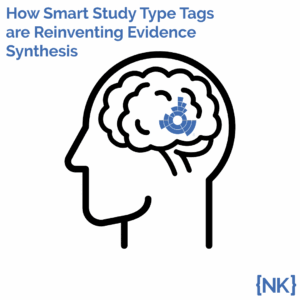
How Smart Study Type Tags Are Reinventing Evidence Synthesis
One of the features of Core Smart Tags is Smart Study Type – this refers to our AI system that automatically categorises the study type
In the realm of conducting systematic literature reviews (SLRs), the question invariably arises: how do these new technologies compare to the trusty spreadsheet? Spreadsheets offer flexibility and a familiar interface, making them the default choice for many researchers. However, as the demands for more streamlined, faster, and AI-assisted SLRs grow, sophisticated tools like Nested Knowledge (NK) are stepping in to revolutionize the process.
We often get asked about the key differences between Nested Knowledge vs spreadsheet use for tagging and data extraction in the SLR process. While spreadsheets provide a basic framework for organizing data, Nested Knowledge offers advanced features tailored specifically for systematic reviews. From tag hierarchies of visualized concepts to AI-assisted extraction and auto-generated interactive outputs, NK streamlines every step of the review process. To illustrate these tradeoffs clearly, we’ve prepared a comparison table outlining the advantages and drawbacks of each approach throughout the SLR process, including highlighting the functionalities gained by opting for Nested Knowledge over traditional spreadsheet methods.
Capabilities: Tagging Hierarchies vs. Spreadsheets
| Topic | Tagging & MA Extraction | Spreadsheets |
| Configuration |
|
|
| Data Relationships |
|
|
| Automation/ Recommendation |
|
|
| Data Provenance |
|
|
| Multi-arm Data |
|
|
| Modification |
|
|
| Auditing |
|
|
| Gathering Process |
|
|
| Meta-Analytical Extraction (Quantitative Data Extraction) |
|
|
| Outputs |
|
|
Spreadsheets retain their value as a useful tool for sharing data, which is why they can be readily downloaded post-extraction in the Nested Knowledge software. However, in today’s fast-paced research landscape, clinging solely to spreadsheets for conducting SLRs can hinder progress, efficiency, traceability, and integration of AI tools. Embracing dedicated software not only enhances the performance and outputs reviews but also saves valuable time and resources. Spreadsheets will always have their place, not only for exporting but also for cases where familiarity and flexibility beyond SLR practices are needed, but for everything from structured SLRs with meta-analysis to AI Rapid Reviews, the choice is clear: modern, transparent, specialized tools like Nested Knowledge.
Yep, you read that right. We started making software for conducting systematic reviews because we like doing systematic reviews. And we bet you do too.
If you do, check out this featured post and come back often! We post all the time about best practices, new software features, and upcoming collaborations (that you can join!).
Better yet, subscribe to our blog, and get each new post straight to your inbox.

One of the features of Core Smart Tags is Smart Study Type – this refers to our AI system that automatically categorises the study type